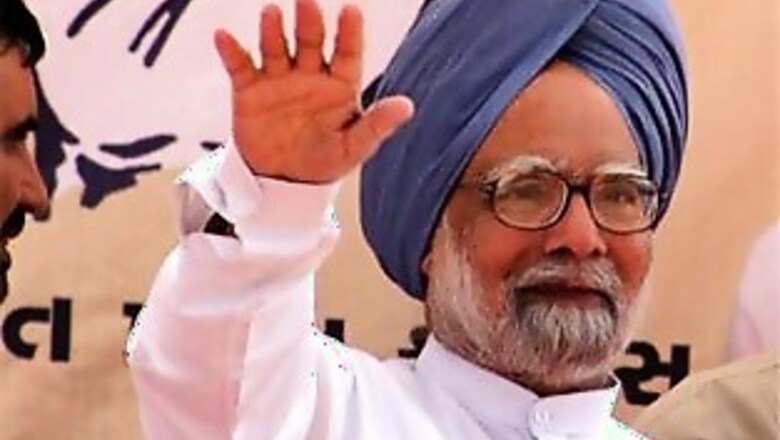
views
New Delhi: Underlining that the challenges lie "primarily at home", Prime Minister Manmohan Singh on Friday unveiled his vision of India in 2020 revolving around the three pillars of inclusive growth, composite culture and a peaceful, forward-looking neighbourhood.
Manmohan Singh also made a strong pitch for sustaining 9-10 per cent economic growth per annum and said the destinies of India and its neighbours are "intrinsically linked".
"First, that our challenges in nation building are primarily at home. And that these are best addressed by ensuring sustained and inclusive economic growth and development," Manmohan Singh said at an annual leadership conclave organised by the Hindustan Times in Delhi.
Putting domestic challenges like poverty and issues of economic and administrative reforms above external challenges, he said, "We do face external and global challenges. The global slowdown is a reality, rise of terrorism is also a reality and we have to face these challenges."
"But I sincerely believe that they are nowhere as daunting as the ones we face at home," he said. "If we get our house in order, if we can liberate each and every citizen of this free nation from the tyranny of poverty, ignorance and disease, there is no external challenge that we cannot overcome," he stressed.
Rejecting the clash of civilisations and sectarianism of all kinds, the Prime Minister said, "Freedom, democracy, pluralism and secularism go together. You cannot have one without the other."
Manmohan Singh identified the pursuit of a peaceful neighbourhood as the third pillar of his vision of "a new India by 2020 and a new South Asia".
"They will remain the three pillars on which the India of 2020 is built. 2020 is not far away," he said.
"India seeks a neighbourhood of peace and progress. We wish our neighbours well," he said. "I do believe our destiny is intrinsically linked with that of all our neighbours. We would like to see them develop and wipe out poverty and overcome the burden of history and we would like to work with them to achieve these goals."
"India is always happy to extend a helpful and supportive hand to all our neighbours. We wish to see democracy take deep roots in all these countries so that the people of South Asia are truly empowered to take their destiny into their own hands."
Without naming Pakistan, the Prime Minister said India sincerely wished "to resolve all outstanding issues with our neighbours through dialogue and in the spirit of partnership and friendship that should rightly characterise our relations."
Noting that Pakistan is grappling with many internal problems, he wished it success in its fight against terrorism.
PAGE_BREAK
In a bid to allay the impression of rivalry with China, Manmohan Singh said there was enough space in the world to accommodate the growth and ambitions of India and China and underlined that the two countries have decided to maintain peace and tranquillity pending the resolution of the border dispute.
Looking ahead, the Prime Minister said India's primary aim in the next decade will be to sustain high rates of economic growth, to ensure that the growth process remains equitable by scaling up investment in social social infrastructure and poverty eradication programmes.
"We should aim to sustain annual growth rates of 9 to 10 per annum," Manmohan Singh said.
He also stressed on a proactive leadership at the state and local level to translate India's developmental aspirations into reality. "India cannot be built from Delhi alone. The focus of the debate on leadership for building a new India should, therefore, shift to the states," he said.
Concern for the environment and climate change also figured prominently in his speech.
"We will approach the international negotiations on global warming, climate change and carbon emissions as responsible global citizens," he said while alluding to India's stand of common but differentiated responsibilities of developed and developing countries.



















Comments
0 comment